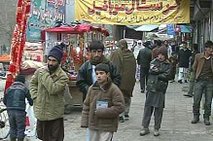MOSCOW – Twenty years after Red Army troops pulled out of Afghanistan, the last general to command them says the Soviets‘ devastating experience is a dismal omen for U.S. plans to build up troops there.
On Friday, the anniversary of the Soviet departure from the Afghan capital, the Russian parliament’s lower house adopted a resolution honoring the soldiers who “were faithful to the warrior’s duty, who displayed heroism, bravery and patriotism.”
In retired Gen. Boris Gromov‘s view, the valor was shown in an unwinnable battle.
“Afghanistan taught us an invaluable lesson … It has been and always will be impossible to solve political problems using force,” said Gromov, the last soldier to leave Afghanistan two days after the Kabul pullout.
He told reporters that U.S. plans to send thousands of new troops to Afghanistan would make no difference against a resurgent Taliban, who came to power in 1996 in the chaos after the Soviet withdrawal.
“One can increase the forces or not — it won’t lead to anything but a negative result,” Gromov said.
The parliament resolution credited the Red Army with the “repulsion of international terrorism and narcotics trade” and “averting a breeding ground for a new war” on Russia’s border.
That appeared to blame Afghanistan’s current fighting and soaring opium trade on the U.S.-led military operation launched in 2001 against the Taliban. Russia’s envoy to NATO, Dmitry Rogozin, has made the same suggestion recently, saying the alliance has repeated the Soviet Union‘s mistakes in Afghanistan and added its own.
The Soviet Union lost some 15,000 soldiers in the war, which began when Moscow sent in troops to battle guerrillas who were fighting a Soviet-supported government. The invasion brought international opprobrium on the Soviet Union — including a boycott of the 1980 Summer Olympics in Moscow by countries including the United States, China and Japan.
It also shocked millions of Soviets who had been taught their massive military was the world’s most potent, but saw their heavy equipment and powerful weaponry overwhelmed by ragged, Western-backed insurgents.
“I don’t see any sense in that war,” veteran Oleg Samoilov told Associated Press Television News. “What did we do, what did we achieve? Practically nothing. There were only dead people left, our dead comrades, their mothers and widows — and that’s it.”
Russia has given nominal support to the international anti-terrorism campaign in Afghanistan, but did not send troops, and there are mixed signals on how fully it backs the operation.
This month, Moscow authorized a $2.15 billion package of aid to Kyrgyzstan that is widely seen as the key factor in the Kyrgyz president’s announcement that a U.S. base will be closed. The base is an important transit point for coalition troops and cargo for Afghanistan and is the home to tanker planes that refuel warplanes over Afghanistan.
But Russia has granted some coalition countries permission to ship Afghanistan-bound military supplies through its territory; Germany even has permission to ship weaponry.
Washington and Moscow are negotiating a deal for the United States to use Russian territory to send supplies to Afghanistan through Russia; news reports this week cited Foreign Ministry officials as saying only some minor details remain to be worked out.
Foreign Minister Sergey Lavrov this week suggested such cooperation could be expanded to allow weapons shipments if the United States shows good faith — presumably an indication that Russia would press Washington hard for concessions on sensitive issues such as NATO expansion and the controversial proposal to put U.S. missile defense elements in Eastern Europe.
 Eurasia Press & News
Eurasia Press & News


